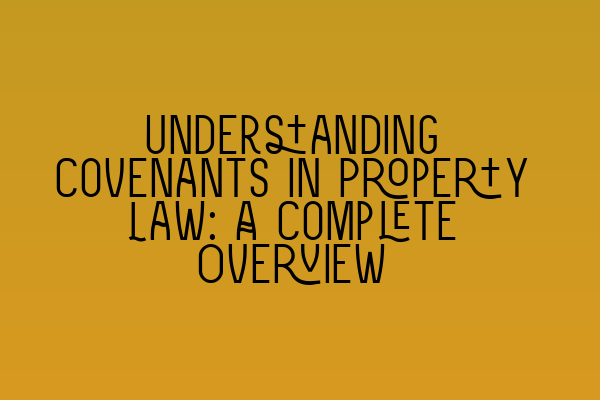Understanding Covenants in Property Law: A Complete Overview
When it comes to property law, one important concept that often crops up is the notion of covenants. Covenants are legally binding agreements that impose specific obligations on parties involved in a property transaction. Whether you are a solicitor, a buyer, a seller, or simply someone interested in property law, having a comprehensive understanding of covenants is essential.
In this article, we will provide you with a complete overview of covenants in property law. We will explain what covenants are, the different types of covenants, how they are created, and how they can be enforceable. So, let’s dive in!
What are Covenants?
Covenants refer to agreements or promises that are typically included in deeds or contracts related to real property. These agreements create legally binding obligations for the parties involved and dictate how the property can be used and maintained.
Covenants can exist in various forms, broadly categorized as positive covenants and restrictive covenants.
Positive Covenants:
Positive covenants require the party benefiting from the covenant to actively do something. For example, a positive covenant may require a property owner to maintain the property’s garden or contribute to the upkeep of communal areas. These covenants are intended to ensure the overall well-being and proper functioning of the property.
Restrictive Covenants:
On the other hand, restrictive covenants limit the actions or behaviors of the party burdened by the covenant. These covenants are often in place to protect the value or enjoyment of the neighboring properties. For instance, a restrictive covenant may prohibit a property owner from building additional structures or engaging in certain activities that could negatively impact the surrounding environment.
How are Covenants Created?
Covenants can be created in several ways, including through contracts, deeds, or statutory regulations. Contracts and deeds are the most common methods of creating covenants between parties involved in a property transaction.
For a covenant to be valid, it must fulfill several requirements. These include:
1. Intention: The parties must have the intention to create a legally binding covenant.
2. Legal Capacity: The parties involved must have the legal capacity to enter into a covenant.
3. Consideration: In most jurisdictions, the covenant must be supported by consideration (a benefit or detriment exchanged between the parties).
4. Writing: Some jurisdictions require covenants to be in writing to be enforceable.
Enforceability of Covenants:
The enforceability of covenants depends on various factors, such as the nature of the covenant, the intention of the parties, and the jurisdiction in which the property is located.
In general, positive covenants are more easily enforceable, as the party benefiting from the covenant can take legal action to compel the party burdened to fulfill their obligations. Restrictive covenants, on the other hand, may be more difficult to enforce, as they often depend on neighbors or affected parties taking legal action to prevent a breach.
It is worth noting that the enforceability of covenants can be affected by changes in legislation, local planning regulations, and the specific wording of the covenant itself.
Understanding the implications and enforceability of covenants in property law is crucial for both solicitors and individuals involved in property transactions. By having a solid grasp on the different types of covenants, their creation, and the factors affecting their enforceability, you can navigate complex property matters with confidence.
If you’re interested in enhancing your knowledge of property law and preparing for the SQE exams, check out our article on SQE 1 Practice Exam Questions for valuable resources. Additionally, consider enrolling in our comprehensive SQE 2 Preparation Courses and SQE 1 Preparation Courses to deepen your understanding and boost your chances of success.
To keep track of the latest SRA SQE Exam Dates and stay up to date with changes in the legal profession, be sure to bookmark our page on SRA SQE Exam Dates. We are committed to helping you stay informed and well-prepared for the challenges ahead.
In conclusion, covenants play a vital role in property law, governing the rights and responsibilities of parties involved in property transactions. By understanding the different types of covenants, their creation, and their enforceability, you can navigate property law matters effectively and protect your clients’ interests. So, whether you’re a solicitor or someone interested in property law, dive into the intricacies of covenants and empower yourself with knowledge.
